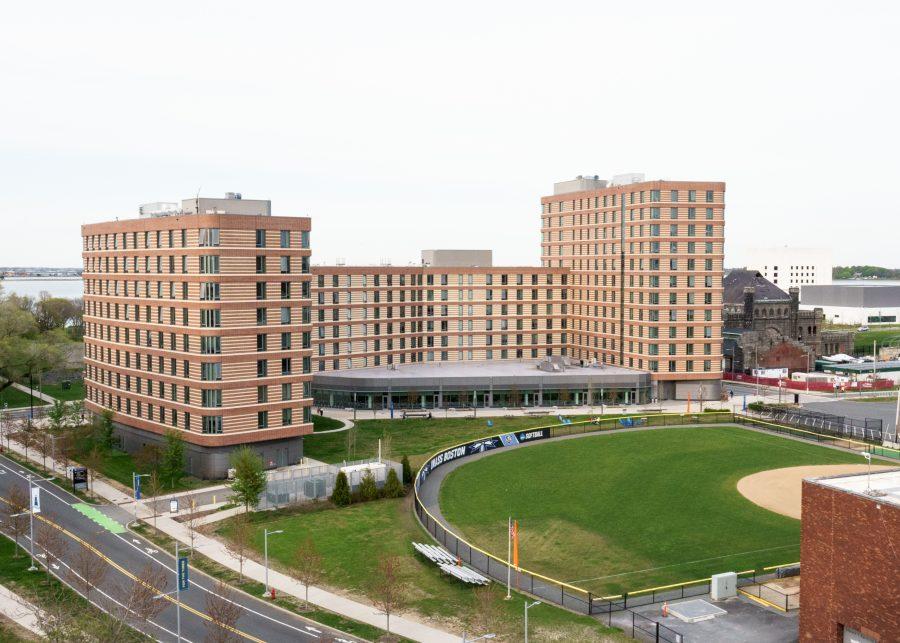It’s the beginning of September and you know what that means! Not only is it the beginning of a new academic year here at UMass Boston, but it’s also move in week. Whether it’s freshmen moving into their dorm rooms and meeting new friends each day, or a new lease in one of the many apartments on Columbia Point or Morrissey Boulevard, a lot of the students taking classes this semester or school year have their hands tied with expenses to pay: both with rent for upperclassmen and room and board for freshmen.
UMass Boston has also been known as a commuter school to a lot of people within the Boston Metropolitan area, not to mention the entire North and South Shore too. With that in mind, the idea of either commuting to school on a daily or sub-weekly basis—if taking all of your classes on “MWF” or “TuTh” is more ideal—can be seen as more desirable to people than renting out an apartment on campus. At the same time, others may prefer fighting for a dorm or apartment on campus. There are substantial differences in living between that of the commuter and that of the on-campus student, which begs the question: what are the pros and cons of renting and commuting, and is one a better option than the other?
Living on campus can be a lot of fun for students but alongside the memories students may make throughout the year are the burdens of expenses. Room and board for freshmen is quite pricey; UMass Boston’s website has prices fluctuating between approximately $10,000 and $14,320, but it is included in tuition and can be paid off in loans. As for people renting out apartments on Columbia Point, prices will vary due to monthly costs in rent. Since rent must be paid on time, students will have to worry about having enough money on hand to pay for it—though living with roommates helps tremendously. Currently, average monthly costs for apartments at Harbor Point on the Bay, one of the more popular on campus living arrangements, sits at about $1800 per month, depending on the number of bedrooms and bathrooms, with utilities to pay on top of that. However, prices can fluctuate based on the number of roommates. Bungalow.com lists utilities costing about $170 per month per person in the city of Boston in the year 2022. Of course, students would have to find jobs as a result and while working about 24-30 hours per week making minimum wage at $14.25 an hour, hypothetically, could do the trick if you live with multiple roommates, finding a job that pays a noticeably higher wage or working more hours would be a much better move. In turn though, this could bring a lot of stress into the lives of students since they would have to balance both work and school, causing burnout.
Commuting and living on campus can also share some similarities though, such as paying for train tickets or gas. The average price of gas in Massachusetts is $4, with Boston coming in at around $5 per gallon, as seen on Triple A’s website. Likewise, monthly costs for an MBTA pass are $90, coming in at $360 per semester; however, purchasing a pass through the school could cut that bill in half if you’re lucky enough to be one of the students to receive a 50 percent subsidy fund, which the school provides on a “first come, first serve” basis. If you were unfortunately unable to receive this subsidy, UMass Boston still provides an 11 percent discount to both graduate and undergraduate students. If you happen to drive to school, parking at the West Garage costs $550 per semester for regular parking or $1200 for a reserved spot, while the Bayside Lot costs $504 per semester—all of these prices are listed on UMass Boston’s website on the page titled “Getting Here”, located under “UMass Boston Resources” drop down at the top of the home page. Gas prices can attribute to both commuters and students on campus though commuters likely spend more on gas per month, and filling a tank two or three times a month adds up. On campus living may not pay for gas as often, given they do not have to commute to and from school, but commuting to and from a job can contribute to a higher cost as well. Commuter Rail monthly passes also bring a hefty price with the highest price coming in at $416 per month. That adds up to about $1,665 per semester at its peak, though in most cases the price is lower, depending on distance.
Overall, the question of whether or not commuting or living on campus is better is dependent on the person or living situation. Depending on the student, renting out an apartment with a couple of friends and having the opportunity to make even more friends as days go by would be desirable, especially if the previous living situation involved both paying rent and household bills at your house on top of commuting. For others, living off campus and saving up money by working and not worrying about as many bills could be seen as a better fit; it becomes a matter of whether you feel like it’s worth waking up earlier and having a longer commute to class. The bottom line is this: There are a lot of pros and cons that come with living on and off campus, and at the end of the day, it’s all about personal preference and determining which lifestyle is more right for you.
Is living on campus worth it, or is it better to commute?
September 2, 2022
The UMass Boston residence halls. Photo by Dom Ferreira / Photography Editor





















































